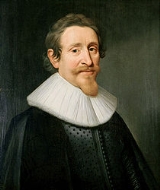
Hugo Grotius
Overview
Jurist
A jurist or jurisconsult is a professional who studies, develops, applies, or otherwise deals with the law. The term is widely used in American English, but in the United Kingdom and many Commonwealth countries it has only historical and specialist usage...
in the Dutch Republic
Dutch Republic
The Dutch Republic — officially known as the Republic of the Seven United Netherlands , the Republic of the United Netherlands, or the Republic of the Seven United Provinces — was a republic in Europe existing from 1581 to 1795, preceding the Batavian Republic and ultimately...
. With Francisco de Vitoria
Francisco de Vitoria
Francisco de Vitoria, OP was a Spanish Renaissance Roman Catholic philosopher, theologian and jurist, founder of the tradition in philosophy known as the School of Salamanca, noted especially for his contributions to the theory of just war and international law...
and Alberico Gentili
Alberico Gentili
Alberico Gentili was an Italian jurist. He left Italy due to his Protestant faith, travelled in Central Europe, and emigrated to England. In 1580 he became regius professor of civil law at the University of Oxford...
he laid the foundations for international law
International law
Public international law concerns the structure and conduct of sovereign states; analogous entities, such as the Holy See; and intergovernmental organizations. To a lesser degree, international law also may affect multinational corporations and individuals, an impact increasingly evolving beyond...
, based on natural law
Natural law
Natural law, or the law of nature , is any system of law which is purportedly determined by nature, and thus universal. Classically, natural law refers to the use of reason to analyze human nature and deduce binding rules of moral behavior. Natural law is contrasted with the positive law Natural...
. He was also a philosopher, theologian, Christian apologist, playwright
Playwright
A playwright, also called a dramatist, is a person who writes plays.The term is not a variant spelling of "playwrite", but something quite distinct: the word wright is an archaic English term for a craftsman or builder...
, and poet
Poet
A poet is a person who writes poetry. A poet's work can be literal, meaning that his work is derived from a specific event, or metaphorical, meaning that his work can take on many meanings and forms. Poets have existed since antiquity, in nearly all languages, and have produced works that vary...
.
Grotius's influence on international law is paramount, and is acknowledged by, for instance, the American Society of International Law
American Society of International Law
The American Society of International Law is a nonprofit, nonpartisan, educational membership organization, based in Washington, D.C.. It was founded in 1906, and was chartered by the United States Congress in 1950...
, which since 1999 holds an annual series of Grotius Lectures
Grotius Lectures
The Grotius Lectures is a series of annual lectures sponsored by the American Society of International Law since 1999. The lecture is named in honour of the famous Dutch jurist, Hugo Grotius , considered by many to be the 'father of international law.' Over the past decade, the lecture has been...
.
Quotations
Liberty is the power that we have over ourselves.
![]()
A man cannot govern a nation if he cannot govern a city; he cannot govern a city if he cannot govern a family; he cannot govern a family unless he can govern himself; and he cannot govern himself unless his passions are subject to reason.
![]()
Even God cannot make two times two not make four.
![]()
Not to know certain things is a great part of wisdom.
![]()

